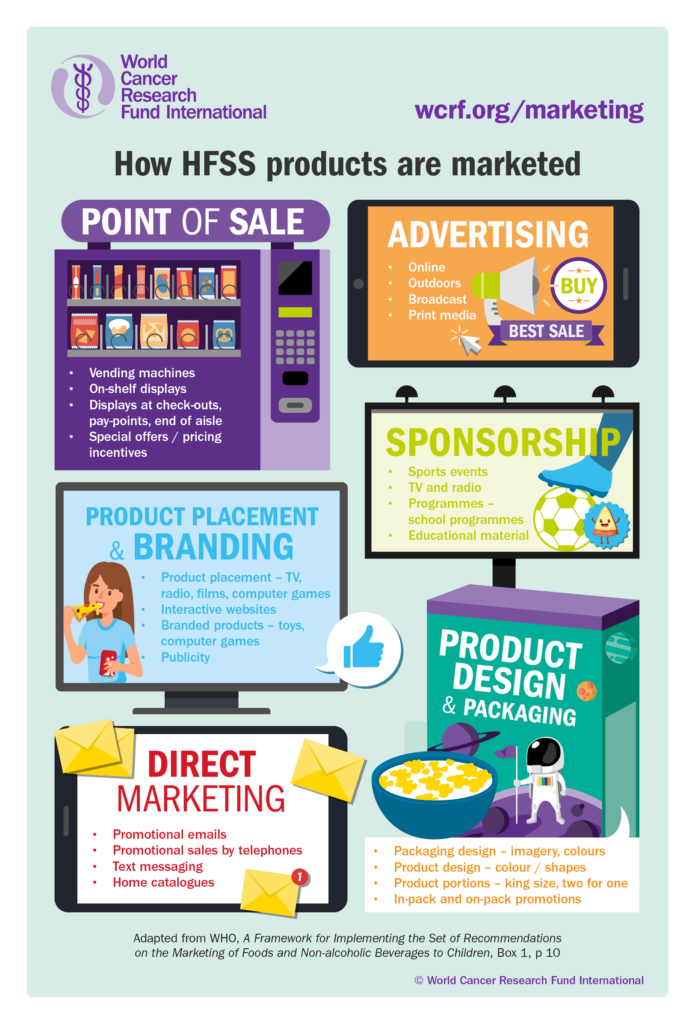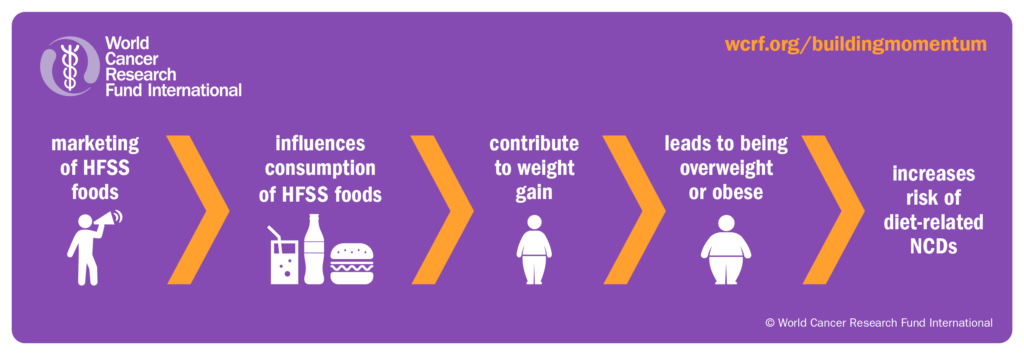The World Cancer Research Fund (WCRF) has developed a series of valuable policy guides intended to serve as roadmaps for government and civil society nutrition champions on how to build coalitions to advocate for, draft, pass, and eventually enforce regulations to protect consumers from commercial foods and beverages that have no place on a healthy plate. The most recent report, on developing robust restrictions on marketing unhealthy food and beverage products to children, follows previous volumes on honest front-of-pack labeling for such foods and tax regimes to reduce consumption of sugar-sweetened beverages. Encouragingly, these reports contribute to a growing array of tools based on the evidence of what works.
Resources like those developed by WCRF are especially crucial in light of expanding global consumption of unhealthy snack foods and evidence of the negative health consequences, despite international calls to curb irresponsible marketing practices. The World Health Assembly issued global guidance in 2016, which aimed to. Such products include any breast-milk substitutes as well as “foods high in saturated fats, trans-fats, free sugars or salt,” consumed by children. Instead, the guidance urges children should be fed “suitable, nutrient-rich, home-prepared, and locally-available foods that are prepared and fed safely.”
Regrettably, reports continue to show that the prevalence of overnutrition in children and adults is growing across low and middle income countries. Further, the once urban problem is accelerating in rural areas as well, as ‘ultra-processed obesogenic foods’ penetrate even the most remote markets.
HKI’s researchers witness this first-hand. Especially egregious examples from our work include cookie packages marketed in Nepal with the slogan “G for Genius” hovering over a child’s face; sugary caramel-flavored corn puffs in the Philippines sporting a cartoon character made by “Nutri-Snack”; and breast-milk substitutes in Senegal that promise the added bifidus will improve children’s brainpower.

This promotion and product distribution strategy has proven wildly effective: research by our ARCH Nutrition team in urban areas of Cambodia, Indonesia, Nepal, and Senegal found that over 80 percent of children 6-23 months of age – those who most need nutrient-dense foods to meet their nutritional requirements – had consumed an unhealthy snack food in the previous week. It also deceives mothers into thinking such products, including breast-milk substitutes, are healthy or desirable. One Cambodian mother expressed to ARCH interviewers, “After drinking infant formula, the child becomes smarter and cuter; also has strong bones and grows well…and feeding him with infant formula creates love between mother and child.” And of course, children love the taste of cookies; candies; and chips, especially when packaged in bright colors and beloved characters, so they beg to be given these foods.
While companies enjoy enormous financial profit from these products, the health costs are borne by the rest of us. In the United States, the National Academies of Science estimated that obesity-related illnesses account for one-fifth of annual medical spending. And these expenses are projected to grow exponentially and globally.
Moreover, these problems are nested within an even larger crisis. As detailed in the recent Lancet Commission publication, The Global Syndemic of Obesity, Undernutrition and Climate Change, our current food production, promotion and consumption machine threatens to destroy not only our health but also the environment and the planet’s ability to produce the nourishing foods we all need to thrive.
These trends highlight the critical need for policy and advocacy tools like those of WCRF, which if taken up and used, can potentially save far more than human health – they can help steer us all toward more sustainable and wholesome food systems. We commend WCRF as they continue to provide the tools for decisionmakers and society leaders to push for better, healthier, and more transparent practices.

